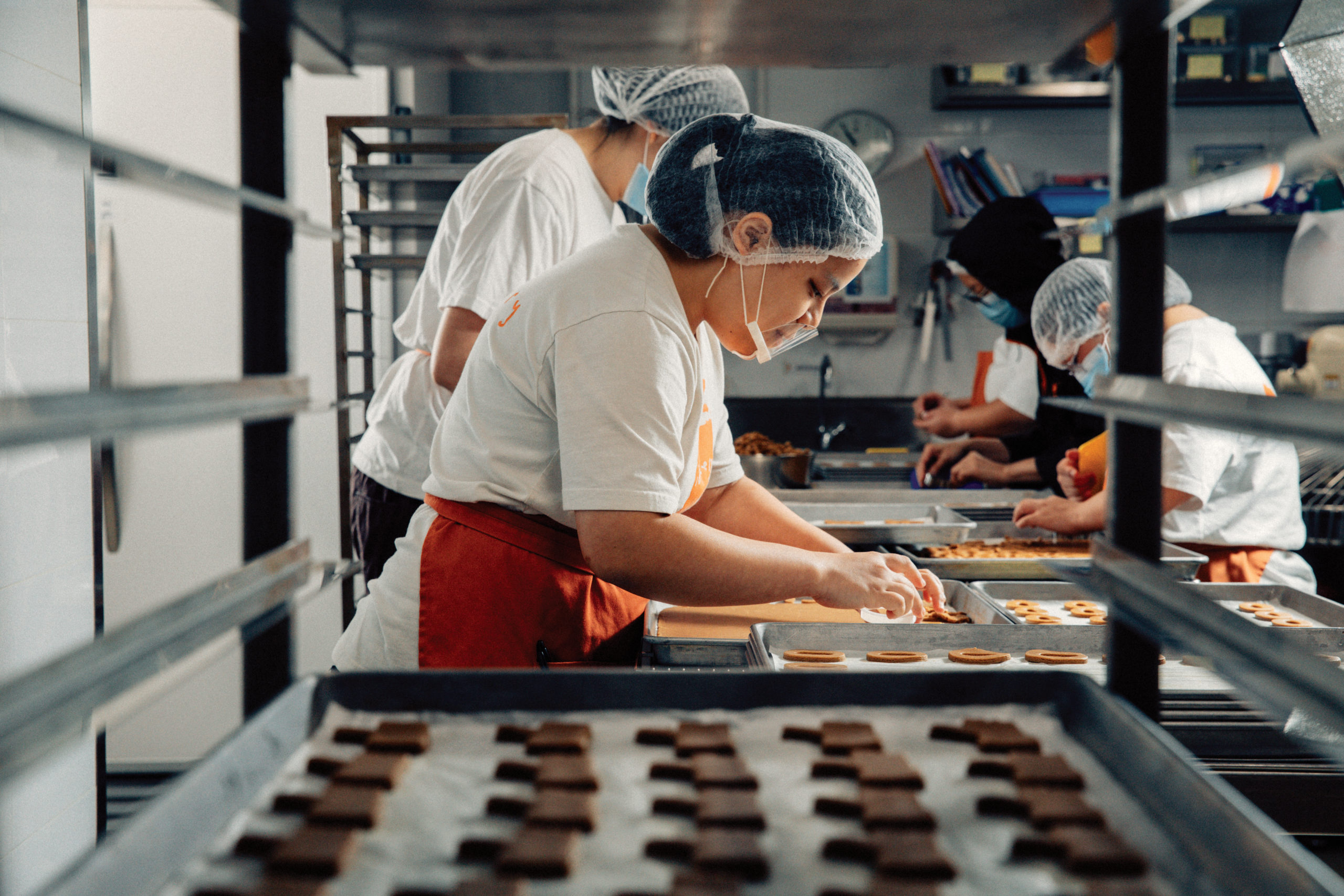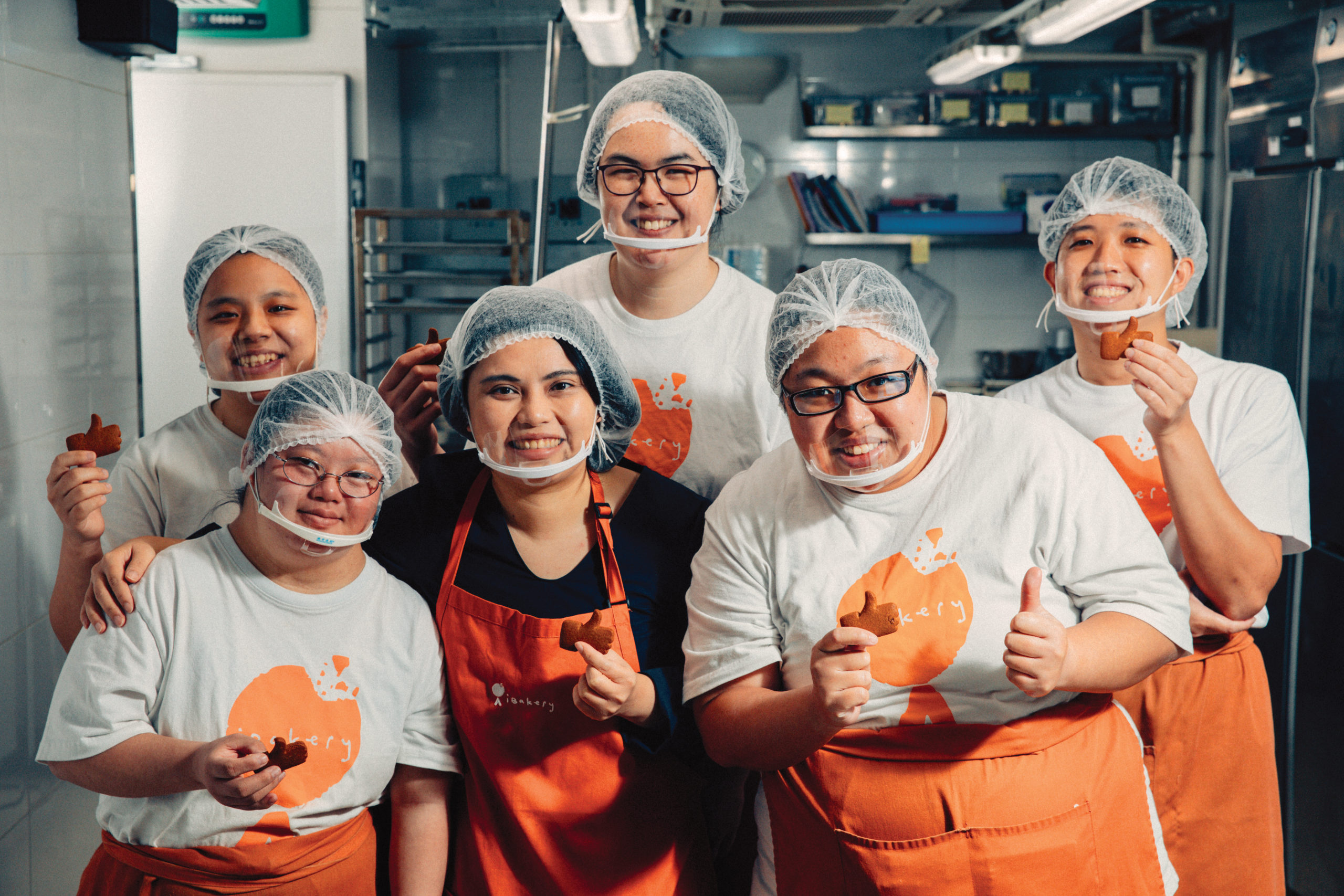There’s a huge choice of cookie types and flavours on the shop shelves, but it’s the handmade ones that seem to be most heartwarming. The first crumbly bite and buttery flavour instantly conjure a vision of the care and artistry of the baker. iBakery is a Hong Kong-based social enterprise. Its products are exceptional: not only because they are handcrafted, but because each process — from preparing ingredients, adjusting portions, kneading, shaping dough, and baking right through to packaging — has involved a team of people with disabilities. The role of each team member is assigned based on their abilities, and they complement each other to create boxes of delicious cookies. The thought that goes into the process of job allocation, and the teamwork that results, are what make these cookies extraordinary.
From bowling to baking
Michelle, 24, has mild intellectual disability, and is one of the bakers at iBakery. Before joining the organisation, she was a professional bowler who represented Hong Kong at the 2015 Special Olympics World Summer Games, where she was a medal winner. But, as well as achieving success in sports, Michelle also needed a stable job — so, four years ago, she decided to join iBakery.

There were a lot of adjustments to make when Michelle first put aside her familiar bowling ball, and found her hands exploring the cookie dough. But she was grateful for the opportunity to learn new skills which could help her make a living. For many people with disabilities, such an opportunity is hard to come by: according to a survey conducted by Hong Kong’s Census and Statistics Department in 2013, it was estimated that only 13.6% of disabled people aged 15 or above were in employment.
“The employment options for disabled graduates are relatively narrow, and this is why we founded iBakery,” explains Rita Chan, its Business Development Manager. Established in 2010, iBakery aims to train and hire people with disabilities; it currently runs a bakery, shops selling bread and cookies, cafés and express snack bars. At present, iBakery has about 120 employees, 60% of whom are people with disabilities — including intellectual disability, autism, learning disability and hearing impairment — as well as recovering mentally-ill people.
“The abilities of disabled people vary greatly, and most organisations may not be able to provide suitable positions for them,” continues Rita. “But iBakery can provide training and employment opportunities suited to individuals’ abilities.”
“The employment options for disabled graduates are relatively narrow, and this is why we founded iBakery”

Tailored development
iBakery hires people with a wide spread of disabilities. Compared to other organisations, the difference in staff abilities is much greater, meaning that individually-tailored training is necessary. “We assign staff to different roles according to their abilities,” continues Rita. “We also try to break down our work processes into smaller parts, and to set standards, that are easier for our staff to follow. Take cookie making as an example: more able staff learn how to make the dough, while less able ones are allocated easier tasks such as cutting the dough into shapes, packaging or cleaning.”
Michelle recalls the early days when she first started her internship at iBakery. She felt nervous and hesitant because of the strange, new environment and training, and even thought about giving up. But, with patient guidance from her trainers, she gradually became accustomed to her new workplace, and got along well with her teammates. “The trainers are very patient and give encouragement; they always tell me to take things slowly and give me opportunities to learn new things.”
Now, Michelle’s baking skills have matured, and she has fully mastered the production of the bakery’s signature Matcha cake, for which she is responsible for making most of the orders. Sometimes, she also assists in teaching others to make piped butter cookies. Her next goal is learning to make honey gingerbread!
It takes a lot of time and effort to train people with disabilities, but Rita is glad to witness her team’s development. They have enhanced their work, self-care abilities and social skills, and gained greater self-confidence. “People with disabilities have their own strengths. Compared with people without disabilities, most of our staff are more patient and focused. For example, it takes a very precise amount of pressure and time to knead the dough into small balls, and the products made by our staff are sometimes therefore even better than those made by the trainers!”

“The trainers are very patient and give encouragement; they always tell me to take things slowly and give me opportunities to learn new things.”
Supporting social enterprises
It’s been ten years since iBakery was founded. As a social enterprise running on commercial lines, it needs to fulfill its social responsibility while still competing in the food and catering sector — adapting to the ever-changing tastes of its customers, their concerns on health and expectation on packaging. To ensure this self-financing model continues to operate sustainably, the organisation is constantly developing new products and refining its sales strategy.
As part of its ongoing CSR programme, Hactl supports and collaborates with a number of social enterprises on a variety of projects. Last year, for example, it purchased 2,500 boxes of cookies from iBakery, as a Christmas gift for its entire workforce to thank them for their hard work. This was also yet another act by Hactl to support social enterprises in Hong Kong — helping people with disabilities to achieve self-reliance, and contributing to a more inclusive society.

